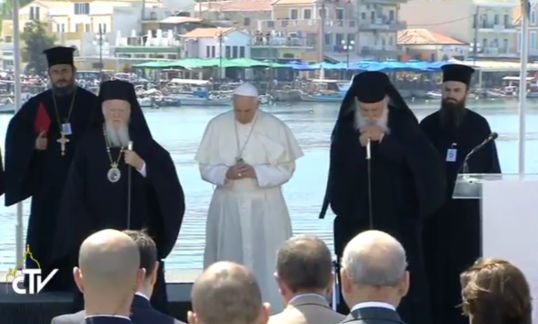
Apr 17, 2016 | Focolare Worldwide
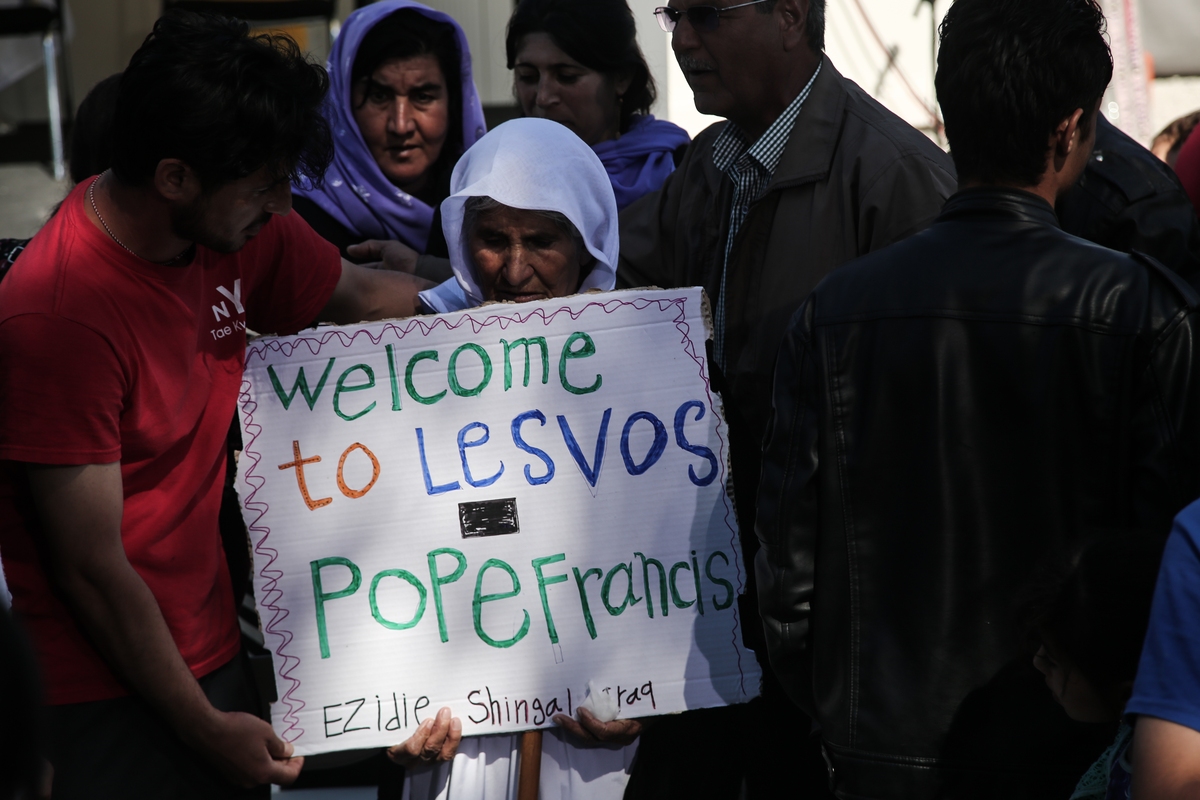
Pope Francis visits the Refugee Camp of Moria, in Mytilene, Lesbos, on April 16, 2016
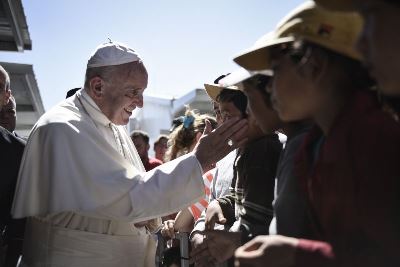 There was nothing but gratitude for the Greek people, expressed in different ways by the three religious leaders: In a moment of great difficulty caused by the serious economic crisis, the people still find the way and the heart to embrace those who flee to a better future. They expressed equal gratitude towards the many volunteers who showed up from all parts of Europe and around the world. Originally from South Africa, Pauline, from the Focolare Movement, has been living for many years between Athens and Lesbo. She repeatedly witnessed the landings of the refugees and helped to rescue them: “The Pope has also sent a political message at the border openings. I wonder why he didn’t go to Idomeni. Perhaps it would have been too political.” Chiara, from Pope John XXIII Association: “He said what I’ve felt for some time: Just stop classifying these people as ‘refugees’, as numbers. It’s time for personal contact, for knowing their stories, their backgrounds;” Eugenio, from the Italian Ambulance Corps at the Order of Malta, said: “I was very moved when he spoke of the children that die on the sea, because I have seen such scenes myself. I managed to shake hands with him and was strengthened for my work.” Cristina is Catholic and her grandparents are refugees that fled from Turkey to Lesvos: “It was an historic event, unimagineable on this island. It seems like a dream”. Father Maurice is coordinator of the Jesuit Refugee Service (JRS) in Greece. He remarked: “All of it was important: the words, the gestures, the silences. All of it spoke. The most powerful moment in the ‘jail’ was the personal contact the Pope had with each person” “A common message was sent to the refugees,” the Jesuit went on to say. They are mainly Muslims discovering a land of Christian origins. Therefore it matters that they see the unity of the Christian leaders and the closeness that these leaders wish to give a witness of.” “Moving. And very important from the ecumenical and political point of view, because of the meeting with Prime Minister, Alexis Tsipras,” said Vasileios Meichanetsidis from Apostles (an NGO from the Greek Orthodox Church). “The Pope recognised how much the Greeks had done, and the Greeks gladly welcomed him.”
There was nothing but gratitude for the Greek people, expressed in different ways by the three religious leaders: In a moment of great difficulty caused by the serious economic crisis, the people still find the way and the heart to embrace those who flee to a better future. They expressed equal gratitude towards the many volunteers who showed up from all parts of Europe and around the world. Originally from South Africa, Pauline, from the Focolare Movement, has been living for many years between Athens and Lesbo. She repeatedly witnessed the landings of the refugees and helped to rescue them: “The Pope has also sent a political message at the border openings. I wonder why he didn’t go to Idomeni. Perhaps it would have been too political.” Chiara, from Pope John XXIII Association: “He said what I’ve felt for some time: Just stop classifying these people as ‘refugees’, as numbers. It’s time for personal contact, for knowing their stories, their backgrounds;” Eugenio, from the Italian Ambulance Corps at the Order of Malta, said: “I was very moved when he spoke of the children that die on the sea, because I have seen such scenes myself. I managed to shake hands with him and was strengthened for my work.” Cristina is Catholic and her grandparents are refugees that fled from Turkey to Lesvos: “It was an historic event, unimagineable on this island. It seems like a dream”. Father Maurice is coordinator of the Jesuit Refugee Service (JRS) in Greece. He remarked: “All of it was important: the words, the gestures, the silences. All of it spoke. The most powerful moment in the ‘jail’ was the personal contact the Pope had with each person” “A common message was sent to the refugees,” the Jesuit went on to say. They are mainly Muslims discovering a land of Christian origins. Therefore it matters that they see the unity of the Christian leaders and the closeness that these leaders wish to give a witness of.” “Moving. And very important from the ecumenical and political point of view, because of the meeting with Prime Minister, Alexis Tsipras,” said Vasileios Meichanetsidis from Apostles (an NGO from the Greek Orthodox Church). “The Pope recognised how much the Greeks had done, and the Greeks gladly welcomed him.”  “We’re all migrants,” the Pope went on to say during the prayer at the port of Lesbo where, as at Lampedusa in 2013, he left a wreath of flowers on the surface of the sea. What is being expected of the political world? “It would be a matter of further stronger appeals especially toward Europe to consider the matter of the migrants and of the refugees not only in terms of internal politics or emergency, but as a new front on which the future of the continent comes into play along with its credibility in terms of its claims of principles and concrete politics,” said pasquale Ferrara, author of the recent book, Il mondo di Francesco. Bergoglio e la politica internazionale. Ferrara is a member of the Abba School for the field of political science and was the Italian Consul to Athens. “The Pope didn’t go there on a humanitarian mission, but wished to underscore this profound dimension,” Ferrara continued. “And the fact that he did it in an ecumenical manner was an even more powerful sign; almost like saying the politics isn’t managing to solve this issue, so we join the game, not as substitutes, but to underscore that this must be a point of priority on the world’s political agenda. The fact that the refugees brought to the Vatican were all Muslims underscores that ISIS is not only exterminating Christians. It is not a problem of religion, but of ending a war, all wars.” Joint Statement Maria Chiara De Lorenzo
“We’re all migrants,” the Pope went on to say during the prayer at the port of Lesbo where, as at Lampedusa in 2013, he left a wreath of flowers on the surface of the sea. What is being expected of the political world? “It would be a matter of further stronger appeals especially toward Europe to consider the matter of the migrants and of the refugees not only in terms of internal politics or emergency, but as a new front on which the future of the continent comes into play along with its credibility in terms of its claims of principles and concrete politics,” said pasquale Ferrara, author of the recent book, Il mondo di Francesco. Bergoglio e la politica internazionale. Ferrara is a member of the Abba School for the field of political science and was the Italian Consul to Athens. “The Pope didn’t go there on a humanitarian mission, but wished to underscore this profound dimension,” Ferrara continued. “And the fact that he did it in an ecumenical manner was an even more powerful sign; almost like saying the politics isn’t managing to solve this issue, so we join the game, not as substitutes, but to underscore that this must be a point of priority on the world’s political agenda. The fact that the refugees brought to the Vatican were all Muslims underscores that ISIS is not only exterminating Christians. It is not a problem of religion, but of ending a war, all wars.” Joint Statement Maria Chiara De Lorenzo
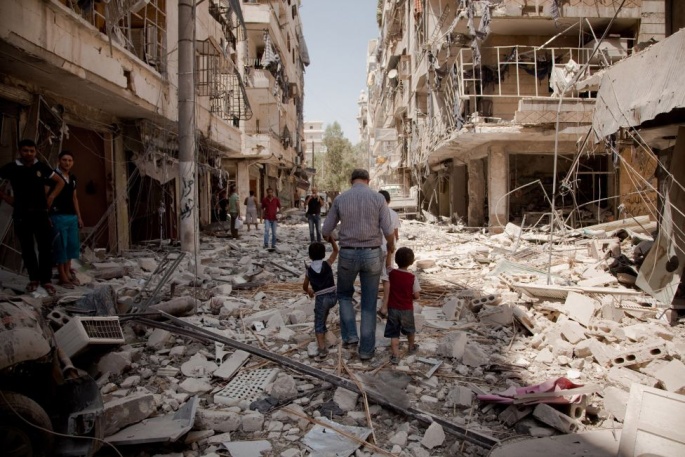
Apr 16, 2016 | Non categorizzato
 “When the conflict in Syria began, seeing that the future didn’t promise anything good, I thought it would be more prudent to leave the country. This idea was strengthened by a job offer in Lebanon. So I secured tickets and began to ready my family for the journey. But many doubts began to crop up inside me. Was it right to go and seek a better future for the family, or was it be better to remain in the country that I loved, to help my people? Talking it over with my wife, I realized that she was more inclined to stay, but she left it up to me. The only thing that mattered to her was that we keep the family together. I felt confused and upset until, one day – I was at church – I clearly felt that our place was here in Aleppo sharing the fate of our people. We are a diverse population made of many ethnic groups, different religions and confessions, but we’ve always lived together in harmony. We’re generous enough to accommodate Palestinians, Lebanese and Iraqis in recent decades, despite the embargo, offering them equal rights and job opportunities. We decided to stay. I worked on my own and earned good money. But after the bloody events that began to devastate the country, my shop was robbed and then destroyed. Nevertheless, there have still been many occasions give assistance through the Centre for the Deaf which my wife and I started to take care of. Later we also began collaboration with other humanitarian organisations to provide – with the help of Providence that has always reached out to us with miraculous assistance – basic necessities to more than 1,500 families. In these five years of war, due to the random bombings in our neighbourhoods, we saw so many families lose their loved ones and so many people left permanently disabled. One day, the driver at the Centre for the Deaf lost his wife and daughter when they were hit by mortar while walking down the street with the family. He was also seriously injured and taken to hospital in a state of shock. I was able to talk about his serious situation with a priest and when the bishop heard of it, he offered to take charge of the funeral for his wife and daughter. For my part, I began to look for money to pay for the Dad’s surgery. Seeing so many people taking an interest him the hospital lowered the costs and some doctors refused to accept payment for their service. So, not only were we able to cover all the expenses, but we had enough money left over to pay for the follow-up treatments that the driver would need. Another time I received a telephone call from a Muslim who works in the church we attend. He was asking me to help him find a house he could live in. He had seen armed rebels entering his district and was worried about his three daughters. After many attempts we finally managed to find a home for them. Once he moved into the new house, he realised he needed a gas cylinder, but could not find one. Then he called me: ‘I ask for this help from you,’ he remarked, ‘because you’re my brother, aren’t you?’ And I answered: “Of course, we are brothers.” Since the recent ceasefire we have experienced a period of apparent calm, although you hear rumblings from time to time that keep us awake at night. Regarding my activities, it’s impossible to even think about beginning them again until the weapons are silenced. The Focolare community is there to support us in the midst of our dangerous situation, along with God’s love that never abandons us. In front of every problem we never feel alone. We continue to experience peace in giving to others, a peace that remains a challenge because it is a gift that must be reconquered each day.”
“When the conflict in Syria began, seeing that the future didn’t promise anything good, I thought it would be more prudent to leave the country. This idea was strengthened by a job offer in Lebanon. So I secured tickets and began to ready my family for the journey. But many doubts began to crop up inside me. Was it right to go and seek a better future for the family, or was it be better to remain in the country that I loved, to help my people? Talking it over with my wife, I realized that she was more inclined to stay, but she left it up to me. The only thing that mattered to her was that we keep the family together. I felt confused and upset until, one day – I was at church – I clearly felt that our place was here in Aleppo sharing the fate of our people. We are a diverse population made of many ethnic groups, different religions and confessions, but we’ve always lived together in harmony. We’re generous enough to accommodate Palestinians, Lebanese and Iraqis in recent decades, despite the embargo, offering them equal rights and job opportunities. We decided to stay. I worked on my own and earned good money. But after the bloody events that began to devastate the country, my shop was robbed and then destroyed. Nevertheless, there have still been many occasions give assistance through the Centre for the Deaf which my wife and I started to take care of. Later we also began collaboration with other humanitarian organisations to provide – with the help of Providence that has always reached out to us with miraculous assistance – basic necessities to more than 1,500 families. In these five years of war, due to the random bombings in our neighbourhoods, we saw so many families lose their loved ones and so many people left permanently disabled. One day, the driver at the Centre for the Deaf lost his wife and daughter when they were hit by mortar while walking down the street with the family. He was also seriously injured and taken to hospital in a state of shock. I was able to talk about his serious situation with a priest and when the bishop heard of it, he offered to take charge of the funeral for his wife and daughter. For my part, I began to look for money to pay for the Dad’s surgery. Seeing so many people taking an interest him the hospital lowered the costs and some doctors refused to accept payment for their service. So, not only were we able to cover all the expenses, but we had enough money left over to pay for the follow-up treatments that the driver would need. Another time I received a telephone call from a Muslim who works in the church we attend. He was asking me to help him find a house he could live in. He had seen armed rebels entering his district and was worried about his three daughters. After many attempts we finally managed to find a home for them. Once he moved into the new house, he realised he needed a gas cylinder, but could not find one. Then he called me: ‘I ask for this help from you,’ he remarked, ‘because you’re my brother, aren’t you?’ And I answered: “Of course, we are brothers.” Since the recent ceasefire we have experienced a period of apparent calm, although you hear rumblings from time to time that keep us awake at night. Regarding my activities, it’s impossible to even think about beginning them again until the weapons are silenced. The Focolare community is there to support us in the midst of our dangerous situation, along with God’s love that never abandons us. In front of every problem we never feel alone. We continue to experience peace in giving to others, a peace that remains a challenge because it is a gift that must be reconquered each day.”
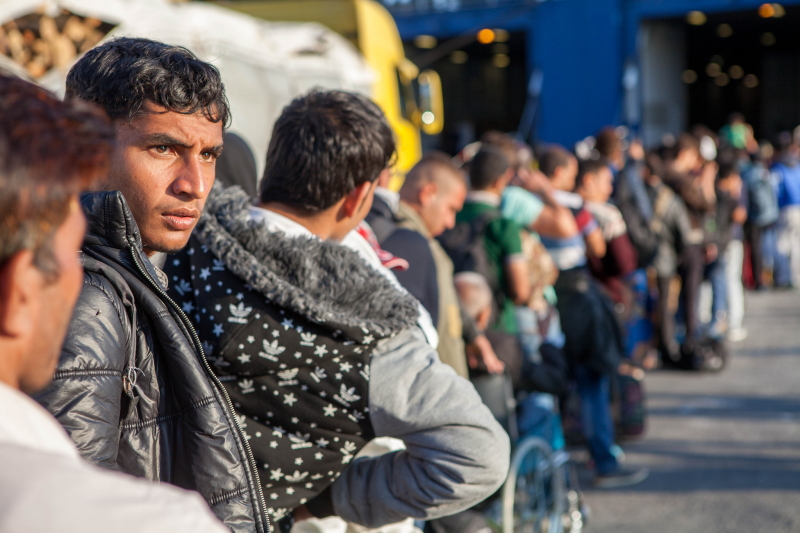
Apr 15, 2016 | Focolare Worldwide

Photo: CAFOD Photo Library
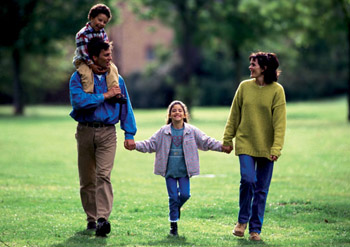
Apr 14, 2016 | Non categorizzato
 After the two Synods on the family, Amoris Laetitia finally announces the ideas of the Pope, this Pope. He is the Pope of mercy, who gathers the approval of those who declare to have “closed” their relations with the Church, or who do not profess any faith. The recent exhortation, set out in over 100 pages, really responds to the expectations of those who hoped in change – very evident on the pastoral level. The doctrinal one has remained unchanged – also for those most bound to tradition. It is a reaching out to all, also to those who find themselves in a so-called “irregular” position. For Pope Francis “no family is a perfect reality and packaged once and for always, but requires a gradual growth of its own capacity to love” (AL 325), as if it aims to remove the tendency to distinguish between ”regulars” and “irregulars” and wants to underline that nobody is condemned and excluded beyond repair. The most significant opening of Amoris Laetitia is certainly intended for the divorced who have remarried, which provides a path of growth in the capacity for discernment, accompanied by pastors or as also cited, by “lay persons who live in the service of the Lord” (AL 312) aware that they are called to “form consciences, and not replace them” (AL 37). It is a path which in certain cases, as stated in the 351st note of the exhortation, could lead also to access to the sacraments, since, the Pope underpins that the Eucharist “is not an award for the perfect, but a generous balm and a nutriment for the weak.” But if the media’s attention is caught precisely by these ‘openings’ to the remarried, it is 4 and 5 (on the beauty of the family that draws inspiration from the Trinitarian design and nurtures on that charity St. Paul spoke about in Cor 1,13) that its merit goes beyond. The centrality of the life of the couples is presented here as never before: “It is the direct encounter face to face with a “thou” who reflects God’s love and is man’s best possession, or as the spouse of the Canticle of Canticles exclaims in a stupendous profession of love in reciprocity: ‘My beloved is mine and I am his. I am my beloved’s and my beloved is mine.” (AL 12-13). «…we often present marriage in such a way that its unitive meaning, call to grow in love and ideal of mutual assistance are overshadowed by an almost exclusive insistence on the duty of procreation.» (AL 36). We need a healthy dose of self-criticism, in our attempt to valorize the eros imbued in creatures, showing marriage in its concrete reality as a “mixture of joys and struggles, tensions and repose, suffering and liberations, satisfactions and longings, and annoyances and pleasures. » (Al 126). Every moment of daily life is highlighted, overcoming the contrast between sacred and profane, and between solemn and unimportant events, since nothing is secondary in the eyes of love and faith. The Pope also takes into account the longer life spans and the initial decision of the spouses that has to be daily renewed» (AL 163), in a continual regeneration and change as each progresses along the path of personal growth and development: «There is no guarantee that we will feel the same way all through life. Yet if a couple can come up with a shared and lasting project, they can love one another and live as one until death do them part, enjoying an enriching intimacy.» (AL 163). Thank you Pope Francis! We really needed the loving care of the Church which continues to present to spouses the high ideal and model of the Trinitarian harmony which has never been reached, and also for the fraternal hand of the Church which stands by all of us, without rejecting anyone.
After the two Synods on the family, Amoris Laetitia finally announces the ideas of the Pope, this Pope. He is the Pope of mercy, who gathers the approval of those who declare to have “closed” their relations with the Church, or who do not profess any faith. The recent exhortation, set out in over 100 pages, really responds to the expectations of those who hoped in change – very evident on the pastoral level. The doctrinal one has remained unchanged – also for those most bound to tradition. It is a reaching out to all, also to those who find themselves in a so-called “irregular” position. For Pope Francis “no family is a perfect reality and packaged once and for always, but requires a gradual growth of its own capacity to love” (AL 325), as if it aims to remove the tendency to distinguish between ”regulars” and “irregulars” and wants to underline that nobody is condemned and excluded beyond repair. The most significant opening of Amoris Laetitia is certainly intended for the divorced who have remarried, which provides a path of growth in the capacity for discernment, accompanied by pastors or as also cited, by “lay persons who live in the service of the Lord” (AL 312) aware that they are called to “form consciences, and not replace them” (AL 37). It is a path which in certain cases, as stated in the 351st note of the exhortation, could lead also to access to the sacraments, since, the Pope underpins that the Eucharist “is not an award for the perfect, but a generous balm and a nutriment for the weak.” But if the media’s attention is caught precisely by these ‘openings’ to the remarried, it is 4 and 5 (on the beauty of the family that draws inspiration from the Trinitarian design and nurtures on that charity St. Paul spoke about in Cor 1,13) that its merit goes beyond. The centrality of the life of the couples is presented here as never before: “It is the direct encounter face to face with a “thou” who reflects God’s love and is man’s best possession, or as the spouse of the Canticle of Canticles exclaims in a stupendous profession of love in reciprocity: ‘My beloved is mine and I am his. I am my beloved’s and my beloved is mine.” (AL 12-13). «…we often present marriage in such a way that its unitive meaning, call to grow in love and ideal of mutual assistance are overshadowed by an almost exclusive insistence on the duty of procreation.» (AL 36). We need a healthy dose of self-criticism, in our attempt to valorize the eros imbued in creatures, showing marriage in its concrete reality as a “mixture of joys and struggles, tensions and repose, suffering and liberations, satisfactions and longings, and annoyances and pleasures. » (Al 126). Every moment of daily life is highlighted, overcoming the contrast between sacred and profane, and between solemn and unimportant events, since nothing is secondary in the eyes of love and faith. The Pope also takes into account the longer life spans and the initial decision of the spouses that has to be daily renewed» (AL 163), in a continual regeneration and change as each progresses along the path of personal growth and development: «There is no guarantee that we will feel the same way all through life. Yet if a couple can come up with a shared and lasting project, they can love one another and live as one until death do them part, enjoying an enriching intimacy.» (AL 163). Thank you Pope Francis! We really needed the loving care of the Church which continues to present to spouses the high ideal and model of the Trinitarian harmony which has never been reached, and also for the fraternal hand of the Church which stands by all of us, without rejecting anyone.
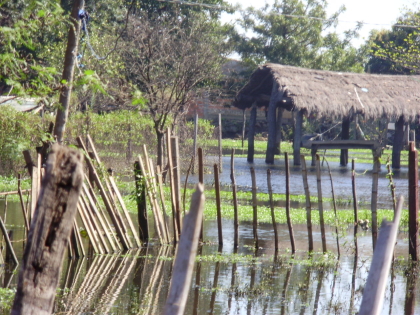
Apr 13, 2016 | Focolare Worldwide, Senza categoria
 “Scholars estimate that from 3000 BC, populations from the Southeast Asian continent arrived here. Among them were also the Guaranì people, composed of many ethnic groups that through the centuries spread to the Caribbean up to the southernmost tip of the continent,” explained Diana Durán, a Paraguayan sociologist and scholar of the aborigines of America. The meeting with a small community of the Avà Guaranì and Mbya ethnic groups came about two years ago, when a big flood of the Paraguay river forced the indigenous group of 33 families (115 members) to abandon the unsteady settlement on the banks of the river where they used to live by gathering wastes from the dumpsite nearby. “At the start we tried to help them with clothing, food, medicine, and healthcare, like the hospitalisation of a diabetic patient, intervening with one of them who had gunshot wounds, renting mobile toilettes when they were sent away to a desert area, or when, after a storm we collected tents and drinking water… and yet we saw that these actions were still insufficient. They needed a piece of land, that could give them shelter and security.“ After a long search, a suitable lot was found: 5.5 hectares at 4.5 km from the city of Ita, with a school and medical dispensary close by. All was surrounded by greens and above all, with the possibility to cultivate a community orchard for their self-support and the space to build a facility for educational courses. The challenge now is to find the finances to buy the land. “We knocked on many doors – Diana recounts. A qualified person helped us to obtain the juridical status as an Indigenous Community, so they would be entitled ownership of the property. Furthermore, a friend of the Mennonite Community offered to advance the payment of the land, which seemed impossible for us to do. We undertook, with our Avà friends, to pay back the money by instalment.” “God has looked on us with special love», the head of the community, Bernardo Benítez, said. It was a God who they regard as the “First and Foremost God,” whose main command is mutual love. He is present in the daily acts and gave this land, a sacred place to protect and where we can build fraternal relationships. “Standing by the Yary Mirì community also means suffering – Dian affirmed – due to the discrimination they suffer because of ancestral prejudices, and the misery they live in. But it is a joy to acknowledge and share the community and solidarity values they have conserved through the centuries, besides the love and trust that has been established between us and them. Today we are not alone but have the support of many friends, two associations linked to the Focolare (Unipar and Yvy Porà) that support the development of the community orchard), two bishops, some officers from financial institutions, two Mennonite Christians and the Indigeneous Pastoral. We obtained four scholarships in Educational Sciences for their leader and three youths. They themselves chose that faculty ‘because our people need education,’ they said.” “I am now writing a book on the history of their community – Diana Durán concluded – not only as a denunciation and to give a voice to those who have no say, but as an obligation to them for what they have suffered and what we owe to them. I consider it a step towards universal brotherhood, our Ideal.”
“Scholars estimate that from 3000 BC, populations from the Southeast Asian continent arrived here. Among them were also the Guaranì people, composed of many ethnic groups that through the centuries spread to the Caribbean up to the southernmost tip of the continent,” explained Diana Durán, a Paraguayan sociologist and scholar of the aborigines of America. The meeting with a small community of the Avà Guaranì and Mbya ethnic groups came about two years ago, when a big flood of the Paraguay river forced the indigenous group of 33 families (115 members) to abandon the unsteady settlement on the banks of the river where they used to live by gathering wastes from the dumpsite nearby. “At the start we tried to help them with clothing, food, medicine, and healthcare, like the hospitalisation of a diabetic patient, intervening with one of them who had gunshot wounds, renting mobile toilettes when they were sent away to a desert area, or when, after a storm we collected tents and drinking water… and yet we saw that these actions were still insufficient. They needed a piece of land, that could give them shelter and security.“ After a long search, a suitable lot was found: 5.5 hectares at 4.5 km from the city of Ita, with a school and medical dispensary close by. All was surrounded by greens and above all, with the possibility to cultivate a community orchard for their self-support and the space to build a facility for educational courses. The challenge now is to find the finances to buy the land. “We knocked on many doors – Diana recounts. A qualified person helped us to obtain the juridical status as an Indigenous Community, so they would be entitled ownership of the property. Furthermore, a friend of the Mennonite Community offered to advance the payment of the land, which seemed impossible for us to do. We undertook, with our Avà friends, to pay back the money by instalment.” “God has looked on us with special love», the head of the community, Bernardo Benítez, said. It was a God who they regard as the “First and Foremost God,” whose main command is mutual love. He is present in the daily acts and gave this land, a sacred place to protect and where we can build fraternal relationships. “Standing by the Yary Mirì community also means suffering – Dian affirmed – due to the discrimination they suffer because of ancestral prejudices, and the misery they live in. But it is a joy to acknowledge and share the community and solidarity values they have conserved through the centuries, besides the love and trust that has been established between us and them. Today we are not alone but have the support of many friends, two associations linked to the Focolare (Unipar and Yvy Porà) that support the development of the community orchard), two bishops, some officers from financial institutions, two Mennonite Christians and the Indigeneous Pastoral. We obtained four scholarships in Educational Sciences for their leader and three youths. They themselves chose that faculty ‘because our people need education,’ they said.” “I am now writing a book on the history of their community – Diana Durán concluded – not only as a denunciation and to give a voice to those who have no say, but as an obligation to them for what they have suffered and what we owe to them. I consider it a step towards universal brotherhood, our Ideal.”
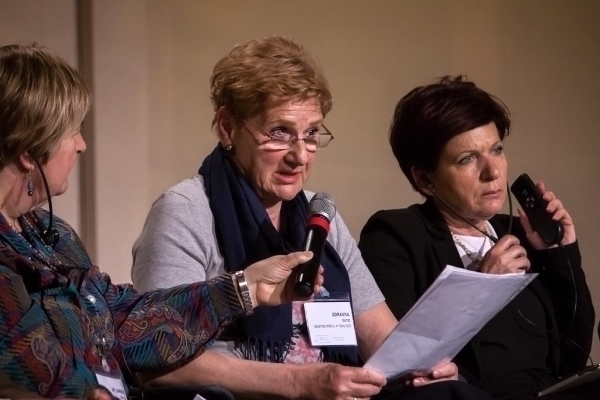
Apr 12, 2016 | Focolare Worldwide
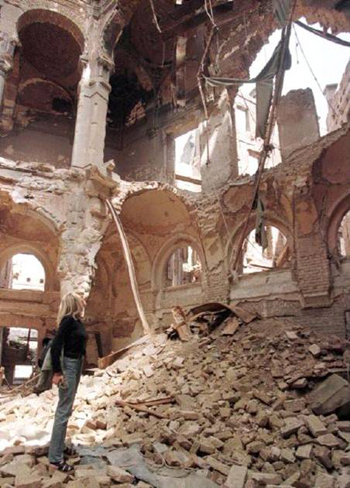 “I come from Sarajevo, Bosnia and Erzegovina, where for centuries, Bosnian Muslims, Croatian Catholics, Orthodox Serbs, Jews, Romani ethnic groups and others have lived alongside one another. The war of the 1990s that wanted to convince us that it is impossible to live together, only wrought thousands of victims, a million refugees, and devastation of cities, religious buildings and historical monuments. In our condominium there were Croatians, Serbs, and Bosnian Muslims, but we shared everything we had with one another, up to the last cigarette, the little oil, flour, coffee and also the pain of death. My husband who was working as an amateur radio technician in the State institutions, had installed a radio station to connect the people who, for months, due to the interruption of telephone lines, knew nothing about their loved ones. When the conflict ended, I started to get involved in politics, in the Social Democratic Party and became a candidate for the post of municipal councilor. The consequences of the war were terrible. In that period, a mayor from Sarayevo received an invitation to participate in the meeting “Together for Europe” in Stuttgart, and delegated me since he couldn’t go. It was then that I was introduced to the Focolare Movement, the people who live to bring unity to humanity. You may well imagine what this meant for me, coming from a war experience. On returning home I felt a great urge to live and fight to diffuse the ideals I had just met. Now, after 20 years, in our city we are still mourning our dead, and rebuilding what was destroyed, but we are also building bridges between people. We do this together, without hatred. And precisely in these days Sarajevo is celebrating the 20th anniversary of the end of the siege of the city, which lasted 1,425 days during which 12,000 civilians were killed, out of which 1,500 were children. The city’s wounds have now healed and it has regained its long lost spirit. The bells ring and prayer arising from the minarets of the mosques echo in the squares. Since I am an agnostic, I found myself involved in the dialogue started by Chiara Lubich with people who have no religious beliefs. I try to weave this network of communion and mutual comprehension in my city, with the Muslim cities nearby, and with the Catholics – for example, during the visit of Pope Francis, and with the people of various beliefs. Today in Sarajevo there is a group of young people, also of different faiths and cultures, who are also trying to diffuse the culture of dialogue.
“I come from Sarajevo, Bosnia and Erzegovina, where for centuries, Bosnian Muslims, Croatian Catholics, Orthodox Serbs, Jews, Romani ethnic groups and others have lived alongside one another. The war of the 1990s that wanted to convince us that it is impossible to live together, only wrought thousands of victims, a million refugees, and devastation of cities, religious buildings and historical monuments. In our condominium there were Croatians, Serbs, and Bosnian Muslims, but we shared everything we had with one another, up to the last cigarette, the little oil, flour, coffee and also the pain of death. My husband who was working as an amateur radio technician in the State institutions, had installed a radio station to connect the people who, for months, due to the interruption of telephone lines, knew nothing about their loved ones. When the conflict ended, I started to get involved in politics, in the Social Democratic Party and became a candidate for the post of municipal councilor. The consequences of the war were terrible. In that period, a mayor from Sarayevo received an invitation to participate in the meeting “Together for Europe” in Stuttgart, and delegated me since he couldn’t go. It was then that I was introduced to the Focolare Movement, the people who live to bring unity to humanity. You may well imagine what this meant for me, coming from a war experience. On returning home I felt a great urge to live and fight to diffuse the ideals I had just met. Now, after 20 years, in our city we are still mourning our dead, and rebuilding what was destroyed, but we are also building bridges between people. We do this together, without hatred. And precisely in these days Sarajevo is celebrating the 20th anniversary of the end of the siege of the city, which lasted 1,425 days during which 12,000 civilians were killed, out of which 1,500 were children. The city’s wounds have now healed and it has regained its long lost spirit. The bells ring and prayer arising from the minarets of the mosques echo in the squares. Since I am an agnostic, I found myself involved in the dialogue started by Chiara Lubich with people who have no religious beliefs. I try to weave this network of communion and mutual comprehension in my city, with the Muslim cities nearby, and with the Catholics – for example, during the visit of Pope Francis, and with the people of various beliefs. Today in Sarajevo there is a group of young people, also of different faiths and cultures, who are also trying to diffuse the culture of dialogue.

Zdravka Gutic sharing her testimony at the convention in April 2016.
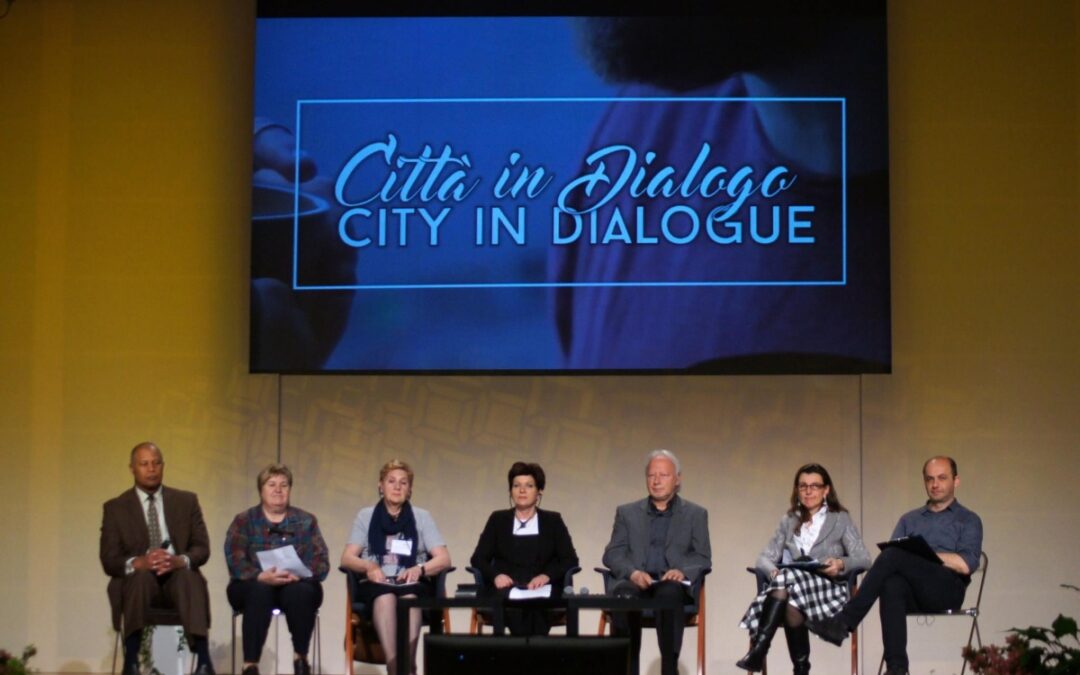
Apr 12, 2016 | Focolare Worldwide
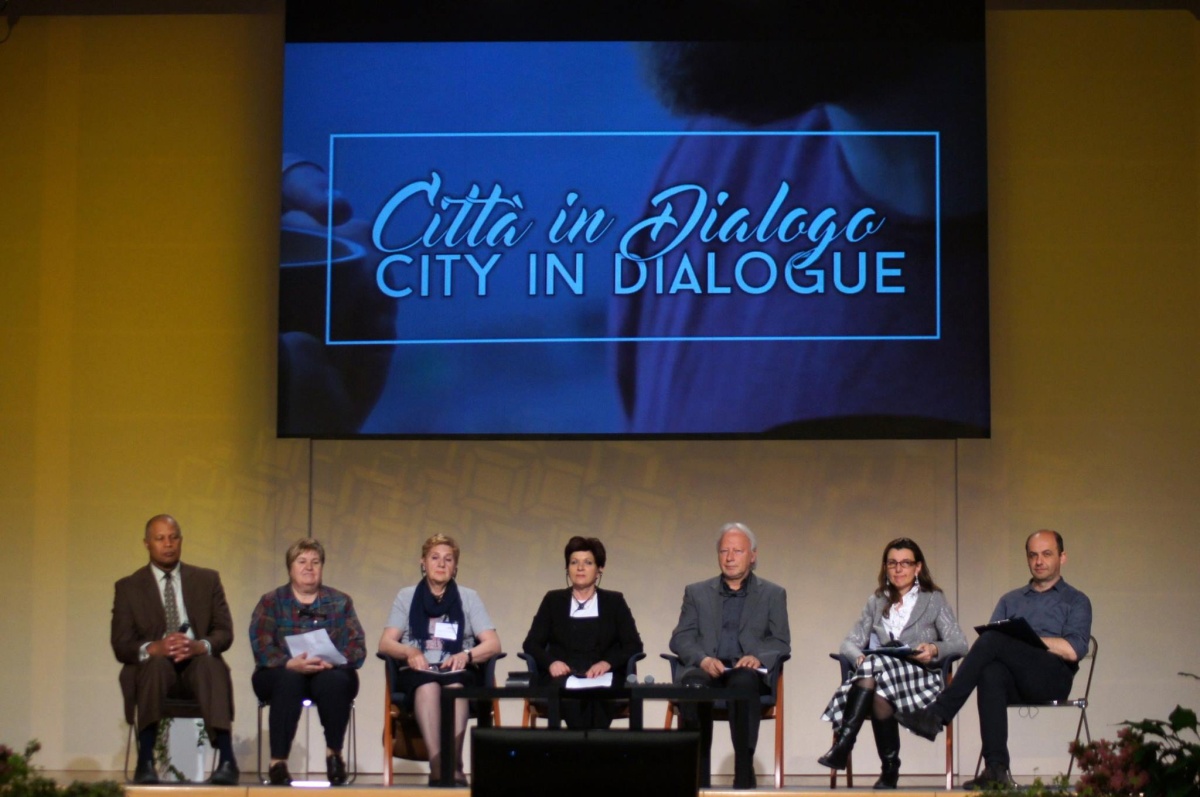 The line is long and quite boring. People of all ages from many parts of the world are patiently waiting for lunch as they share their thoughts and opinions about the morning. The first session of the OnCity – Networks of lights to inhabit the planet Conference has just concluded. The conference took place on April 1-3, 2016 and really showed the many lights that have been lit up in our cities. “Rather than dwelling on an analysis of the darkness,” says Lucia Fronza Crepaz who is the moderator, “we’ve decided to turn our attention to the dawn, to the rising sun.” OnCity is organised by the New Humanity Movement, Youth For a United World, and the United World Project which are Focolare agencies actively engaged in building a more united and fraternal world at the social level, amongst young and old and through support and development projects. Certainly the current news stories constantly cry out to us : bombings, terrorism, new forms of marginalisation and poverty, piecemeal wars. Our cities are experiencing problems and contradictions in front of our very eyes. But there are also very positive and well-established experiences which confirm that it is possible to work, to hope, to believe in a more supportive and fraternal city that would be more liveable for everyone. With this awareness the organisers set out to create a three-day event in which the nearly 900 participants would be given the opportunity to experience a new kind of city life with one another, that could be taken back to their home environments. It was an opportunity to examine the topics of solidarity and fraternity in order to be be able to interpret the changes we see taking place in the cities where we live, and to learn a lifestyle based on dialogue. OnCity played out in three plenary sessions, thematic seminars and a good 32 work groups which were useful for coming to an understanding of their ability to be active, creative and responsible citizens. Forty six presentations were squeezed into those days with the purpose of valuing and appreciating the networks that already exist and encouraging new ones where needed: starting up “cells of brotherhood” wherever we are. Source: Città Nuova online
The line is long and quite boring. People of all ages from many parts of the world are patiently waiting for lunch as they share their thoughts and opinions about the morning. The first session of the OnCity – Networks of lights to inhabit the planet Conference has just concluded. The conference took place on April 1-3, 2016 and really showed the many lights that have been lit up in our cities. “Rather than dwelling on an analysis of the darkness,” says Lucia Fronza Crepaz who is the moderator, “we’ve decided to turn our attention to the dawn, to the rising sun.” OnCity is organised by the New Humanity Movement, Youth For a United World, and the United World Project which are Focolare agencies actively engaged in building a more united and fraternal world at the social level, amongst young and old and through support and development projects. Certainly the current news stories constantly cry out to us : bombings, terrorism, new forms of marginalisation and poverty, piecemeal wars. Our cities are experiencing problems and contradictions in front of our very eyes. But there are also very positive and well-established experiences which confirm that it is possible to work, to hope, to believe in a more supportive and fraternal city that would be more liveable for everyone. With this awareness the organisers set out to create a three-day event in which the nearly 900 participants would be given the opportunity to experience a new kind of city life with one another, that could be taken back to their home environments. It was an opportunity to examine the topics of solidarity and fraternity in order to be be able to interpret the changes we see taking place in the cities where we live, and to learn a lifestyle based on dialogue. OnCity played out in three plenary sessions, thematic seminars and a good 32 work groups which were useful for coming to an understanding of their ability to be active, creative and responsible citizens. Forty six presentations were squeezed into those days with the purpose of valuing and appreciating the networks that already exist and encouraging new ones where needed: starting up “cells of brotherhood” wherever we are. Source: Città Nuova online
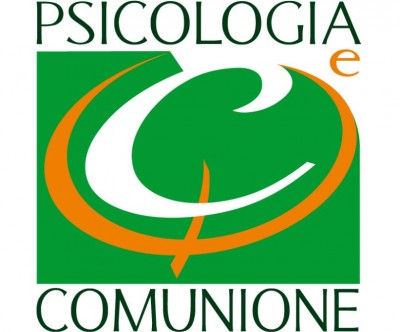
Apr 11, 2016 | Non categorizzato
 Organised by: Psychology and Communion Topic: “Psychology’s contribution to dialogue” Participants: 50-60 young psychologists from Brazil, Argentina, Chile and Europe. (Scholarships available for young students) Info: info@psy-com.org www.psy-com.org
Organised by: Psychology and Communion Topic: “Psychology’s contribution to dialogue” Participants: 50-60 young psychologists from Brazil, Argentina, Chile and Europe. (Scholarships available for young students) Info: info@psy-com.org www.psy-com.org
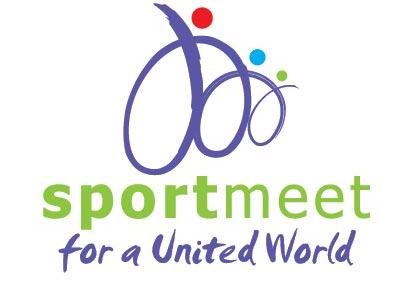
Apr 11, 2016 | Non categorizzato
 Organised by: Sportmeet and the Krizevci Kinesiology Association (a local association of physical education teachers from Croatia and Serbia). Participants: 50 teachers, young students and other professionals (Scholarships available for young students) Info: info@sportmeet.org www.sportmeet.org
Organised by: Sportmeet and the Krizevci Kinesiology Association (a local association of physical education teachers from Croatia and Serbia). Participants: 50 teachers, young students and other professionals (Scholarships available for young students) Info: info@sportmeet.org www.sportmeet.org

Apr 11, 2016 | Non categorizzato
 Organised by: Communion and Law The summer school dedicated mainly to law students and young professionals between the ages of 20 and 35, will provide an opportunity to be in direct contact with Sicily’s natural environment and the wave of refugees. The summer school is part of an ongoing process involving a group of young people and is meant to be a follow-up to the 2015 “Environment and Rights” conference held in Castel Gandolfo, Italy, in November 2015. Programme Info: info@comunionediritto.org www.comunionediritto.org
Organised by: Communion and Law The summer school dedicated mainly to law students and young professionals between the ages of 20 and 35, will provide an opportunity to be in direct contact with Sicily’s natural environment and the wave of refugees. The summer school is part of an ongoing process involving a group of young people and is meant to be a follow-up to the 2015 “Environment and Rights” conference held in Castel Gandolfo, Italy, in November 2015. Programme Info: info@comunionediritto.org www.comunionediritto.org

 There was nothing but gratitude for the Greek people, expressed in different ways by the three religious leaders: In a moment of great difficulty caused by the serious economic crisis, the people still find the way and the heart to embrace those who flee to a better future. They expressed equal gratitude towards the many volunteers who showed up from all parts of Europe and around the world. Originally from South Africa, Pauline, from the Focolare Movement, has been living for many years between Athens and Lesbo. She repeatedly witnessed the landings of the refugees and helped to rescue them: “The Pope has also sent a political message at the border openings. I wonder why he didn’t go to Idomeni. Perhaps it would have been too political.” Chiara, from Pope John XXIII Association: “He said what I’ve felt for some time: Just stop classifying these people as ‘refugees’, as numbers. It’s time for personal contact, for knowing their stories, their backgrounds;” Eugenio, from the Italian Ambulance Corps at the Order of Malta, said: “I was very moved when he spoke of the children that die on the sea, because I have seen such scenes myself. I managed to shake hands with him and was strengthened for my work.” Cristina is Catholic and her grandparents are refugees that fled from Turkey to Lesvos: “It was an historic event, unimagineable on this island. It seems like a dream”. Father Maurice is coordinator of the Jesuit Refugee Service (JRS) in Greece. He remarked: “All of it was important: the words, the gestures, the silences. All of it spoke. The most powerful moment in the ‘jail’ was the personal contact the Pope had with each person” “A common message was sent to the refugees,” the Jesuit went on to say. They are mainly Muslims discovering a land of Christian origins. Therefore it matters that they see the unity of the Christian leaders and the closeness that these leaders wish to give a witness of.” “Moving. And very important from the ecumenical and political point of view, because of the meeting with Prime Minister, Alexis Tsipras,” said Vasileios Meichanetsidis from Apostles (an NGO from the Greek Orthodox Church). “The Pope recognised how much the Greeks had done, and the Greeks gladly welcomed him.”
There was nothing but gratitude for the Greek people, expressed in different ways by the three religious leaders: In a moment of great difficulty caused by the serious economic crisis, the people still find the way and the heart to embrace those who flee to a better future. They expressed equal gratitude towards the many volunteers who showed up from all parts of Europe and around the world. Originally from South Africa, Pauline, from the Focolare Movement, has been living for many years between Athens and Lesbo. She repeatedly witnessed the landings of the refugees and helped to rescue them: “The Pope has also sent a political message at the border openings. I wonder why he didn’t go to Idomeni. Perhaps it would have been too political.” Chiara, from Pope John XXIII Association: “He said what I’ve felt for some time: Just stop classifying these people as ‘refugees’, as numbers. It’s time for personal contact, for knowing their stories, their backgrounds;” Eugenio, from the Italian Ambulance Corps at the Order of Malta, said: “I was very moved when he spoke of the children that die on the sea, because I have seen such scenes myself. I managed to shake hands with him and was strengthened for my work.” Cristina is Catholic and her grandparents are refugees that fled from Turkey to Lesvos: “It was an historic event, unimagineable on this island. It seems like a dream”. Father Maurice is coordinator of the Jesuit Refugee Service (JRS) in Greece. He remarked: “All of it was important: the words, the gestures, the silences. All of it spoke. The most powerful moment in the ‘jail’ was the personal contact the Pope had with each person” “A common message was sent to the refugees,” the Jesuit went on to say. They are mainly Muslims discovering a land of Christian origins. Therefore it matters that they see the unity of the Christian leaders and the closeness that these leaders wish to give a witness of.” “Moving. And very important from the ecumenical and political point of view, because of the meeting with Prime Minister, Alexis Tsipras,” said Vasileios Meichanetsidis from Apostles (an NGO from the Greek Orthodox Church). “The Pope recognised how much the Greeks had done, and the Greeks gladly welcomed him.”  “We’re all migrants,” the Pope went on to say during the prayer at the port of Lesbo where, as at Lampedusa in 2013, he left a wreath of flowers on the surface of the sea. What is being expected of the political world? “It would be a matter of further stronger appeals especially toward Europe to consider the matter of the migrants and of the refugees not only in terms of internal politics or emergency, but as a new front on which the future of the continent comes into play along with its credibility in terms of its claims of principles and concrete politics,” said pasquale Ferrara, author of the recent book, Il mondo di Francesco. Bergoglio e la politica internazionale. Ferrara is a member of the Abba School for the field of political science and was the Italian Consul to Athens. “The Pope didn’t go there on a humanitarian mission, but wished to underscore this profound dimension,” Ferrara continued. “And the fact that he did it in an ecumenical manner was an even more powerful sign; almost like saying the politics isn’t managing to solve this issue, so we join the game, not as substitutes, but to underscore that this must be a point of priority on the world’s political agenda. The fact that the refugees brought to the Vatican were all Muslims underscores that ISIS is not only exterminating Christians. It is not a problem of religion, but of ending a war, all wars.” Joint Statement Maria Chiara De Lorenzo
“We’re all migrants,” the Pope went on to say during the prayer at the port of Lesbo where, as at Lampedusa in 2013, he left a wreath of flowers on the surface of the sea. What is being expected of the political world? “It would be a matter of further stronger appeals especially toward Europe to consider the matter of the migrants and of the refugees not only in terms of internal politics or emergency, but as a new front on which the future of the continent comes into play along with its credibility in terms of its claims of principles and concrete politics,” said pasquale Ferrara, author of the recent book, Il mondo di Francesco. Bergoglio e la politica internazionale. Ferrara is a member of the Abba School for the field of political science and was the Italian Consul to Athens. “The Pope didn’t go there on a humanitarian mission, but wished to underscore this profound dimension,” Ferrara continued. “And the fact that he did it in an ecumenical manner was an even more powerful sign; almost like saying the politics isn’t managing to solve this issue, so we join the game, not as substitutes, but to underscore that this must be a point of priority on the world’s political agenda. The fact that the refugees brought to the Vatican were all Muslims underscores that ISIS is not only exterminating Christians. It is not a problem of religion, but of ending a war, all wars.” Joint Statement Maria Chiara De Lorenzo












